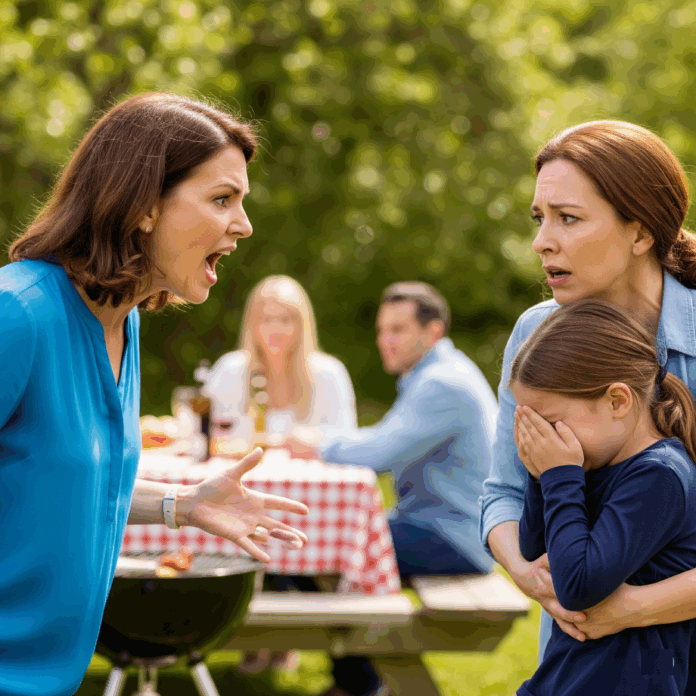
My sister slapped my daughter in front of everyone for being “too noisy.” My parents laughed.
It was supposed to be a pleasant family picnic—sunshine, laughter, grilled food, and childhood memories. The park was vibrant with the scent of blooming flowers and sizzling barbecue. My daughter Emily, only seven, was twirling near the table with innocent glee, her high-pitched giggles weaving through the trees. She had just discovered a ladybug on her arm and was announcing it with the same enthusiasm as someone who’d found gold.
Then came the moment I’ll never forget.
Without warning, my sister Karen stormed up, her face twisted in irritation. “Emily, shut up already!” she hissed, her voice sharp enough to pierce the merriment. Before I could rise from my seat, she raised her hand—and slapped my daughter across the face.
The sound was loud. So loud it silenced the breeze.
Emily froze, her smile vanishing. She turned and buried her face into my stomach, sobbing. I was stunned. It took me a second to register what had just happened.
Then I heard it.
Laughter.
Not from strangers—but from my own parents.
Dad chuckled, shaking his head, “Karen always had a firm hand.”
Mom sipped her wine and smirked, “Kids these days are too soft anyway.”
I stood there, completely still, Emily clutching at my waist. No one—absolutely no one—stepped in. Not to comfort Emily. Not to question Karen. Not even to show concern. My husband, Derek, who was sitting nearby, looked up in shock—but before he could say anything, Karen turned and snapped, “She was shrieking like a banshee! I just did what you should’ve.”
That’s when something inside me snapped.
“Get your things. We’re leaving,” I said, my voice shaking with a cold fury. Derek moved quickly to gather our bags. Emily still hadn’t looked up.
Karen scoffed. “You’re seriously making a scene? Over that? Oh, grow up.”
I ignored her and looked at my parents.
“You really think that was okay?”
Dad shrugged. “You used to be noisy too. Didn’t hurt you to be corrected.”
“Corrected?” I repeated, blinking in disbelief. “That wasn’t correction. That was assault.”
Mom rolled her eyes. “Oh, stop being so dramatic, Julia. She barely touched her.”
Emily whimpered, still clinging to me. Her cheek was red, her small body trembling.
I walked away.
We didn’t say goodbye. We didn’t need to.
The silence in the car on the way home was thick. Derek kept his hand on my leg, occasionally squeezing it, but we didn’t speak. Emily had fallen asleep in the backseat from exhaustion, her tears still fresh on her cheeks.
That night, I couldn’t sleep. I kept replaying the moment in my head—the slap, the laughter, the lack of outrage.
Was this the same family I grew up with?
The next morning, I took Emily to school, and while she didn’t mention the picnic, I saw her flinch when a teacher raised her voice slightly in class. That broke me again.
I called Karen that afternoon.
“Karen, we need to talk,” I said coldly.
“Oh, here we go again,” she replied. “What now?”
“You hit my daughter. That is never okay.”
“She was yelling and being obnoxious. And you were just sitting there doing nothing. I disciplined her because you wouldn’t.”
“She’s seven, Karen!” I yelled. “And she wasn’t your child to discipline.”
There was a pause.
“You’ve always been too soft. That’s why Emily is the way she is. Spoiled. Loud. Undisciplined.”
That was all I needed to hear.
I blocked her number.
Then I sent a group message to my family, stating clearly that Karen was no longer welcome around Emily—and neither were they, if they continued to excuse her behavior.
My phone buzzed nonstop after that.
“Don’t punish the whole family.”
“You’re overreacting.”
“Karen’s just blunt.”
Not one apology. Not one acknowledgment of the harm caused. Not one concern for Emily.
The following days were quiet—almost eerily so. Emily asked if we were going to Nana and Papa’s again that weekend.
I hesitated. “No, sweetheart. Not for a while.”
“Is it because of the slap?”
I was floored. “You remember that?”
She nodded, playing with the edge of her shirt. “Aunt Karen doesn’t like me. And Nana laughed.”
Tears welled in my eyes. “That wasn’t your fault, baby. None of it was your fault.”
“I won’t be loud again,” she said.
I pulled her into my arms. “No. You don’t have to change. They do.”
That was the moment I made up my mind.
We weren’t just going to distance ourselves.
We were going to heal, without them.
A week passed. Then two.
Not a single call. Not from my parents. Not from Karen. I suppose in their world, I was the dramatic one—the emotional one who couldn’t take a joke, couldn’t handle “a little tough love.”
But what they didn’t understand was that this wasn’t about one slap.
It was about every time they ignored boundaries. Every time they undermined my parenting. Every time they laughed off cruelty like it was just part of being “family.”
It started with the letter.
Not an email. Not a text. A handwritten letter, mailed to my parents and Karen. I spent days drafting it.
“You’ve taught me many things growing up—how to be polite, how to work hard, how to stay quiet to keep the peace. But you never taught me how to stand up for myself. I had to learn that on my own.
I always knew Karen was the favorite. You laughed at her cruelty and called it ‘honesty.’ You encouraged her to ‘put people in their place’ and dismissed the harm she caused. I endured it as a child. But I won’t let my daughter endure it now.
Emily is kind, vibrant, and expressive. She is not a burden to be tamed. She is not ‘too much.’ She is a child. A good one. And she deserves to feel safe in her family. You took that away from her. And you showed her that adults who hurt children are not only allowed—but applauded.
That’s not the kind of family we’ll be part of anymore.
If you ever want to be in Emily’s life again, you will need to start with a real apology. No excuses. No minimizing. Just honesty. Until then, we’re done.”
I mailed it and braced for the fallout.
It came fast.
Karen posted a vague Facebook status about “self-righteous mothers raising snowflakes.” Mom commented with three clapping emojis.
I didn’t respond.
Dad sent a short email:
“If you ever want to talk without the drama, you know where to find us.”
I didn’t respond to that either.
Instead, I poured my time into Emily.
We started Saturday adventures—just the two of us. Painting pottery, hiking with Derek, exploring museums. I watched as the lines of anxiety around her eyes began to fade. She laughed again. Loudly. And I let her.
I enrolled her in theater class. The first time she stood on stage and recited lines as a beaming sunflower, I cried. Not because she was perfect—but because she was herself.
Unapologetically.
Then one day, I got a call I didn’t expect.
It was from my cousin Lydia—Karen’s younger sister.
“Julia,” she said, hesitating. “I read your letter. Aunt Carol left it on the table. I just wanted to say… I’m proud of you.”
I was stunned. “You are?”
“Karen used to hit me, too,” she said quietly. “Not as adults. When we were kids. I told your mom once. She laughed and said, ‘Sisters fight, get over it.’ So I stopped talking about it. But I’ve never forgotten.”
There was a long silence between us.
“I wish someone had stood up for me the way you did for Emily.”
It hit me then—my letter hadn’t just drawn a line. It had cracked something open.
Lydia wasn’t the only one who reached out in the following weeks. An old friend of Karen’s messaged to say she stopped talking to her years ago for “crossing the line too many times.” Another cousin called to say she always felt uncomfortable around our family, but didn’t know why.
The silence we had grown up with wasn’t peace.
It was fear.
Three months later, I received a plain envelope in the mail.
No return address. Karen’s handwriting inside.
“Julia,
I’ve been thinking a lot about what happened. I didn’t write sooner because I was angry—but I’ve realized something. I slapped a child. My niece. And I justified it because that’s how we were raised. But that doesn’t make it okay.
I don’t expect you to forgive me. I don’t even know if I deserve to see Emily again. But I am sorry.
I’m starting therapy. For real this time. Not because you told me to—but because I finally understand why I need to.
I hope one day we can talk.
Karen”
I read it three times.
Then I looked at Emily playing in the backyard, her chalk drawings painting rainbows across the pavement.
I didn’t cry. I didn’t rejoice.
But I felt something shift.
We didn’t see Karen for a long while after that. But the conversation was opened.
When I finally spoke to my parents again, it was because they reached out—both of them, together—asking to meet and “listen.”
They apologized.
It wasn’t perfect. But it was a start.
We didn’t go back to being the same family.
We became something different.
Something that didn’t pretend everything was fine when it wasn’t.
Something that didn’t laugh at pain.
Something that, maybe, had a chance.
